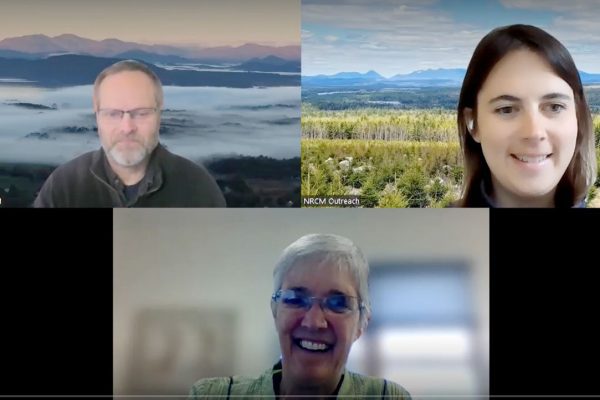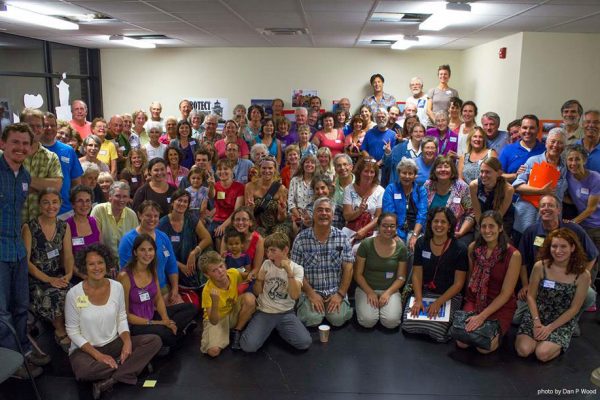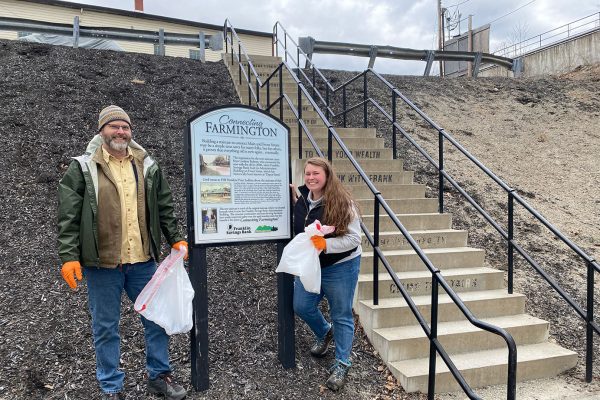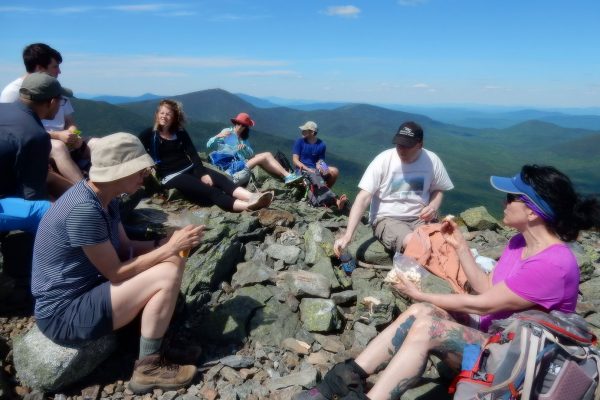People who love Maine value the state’s spectacular woods, waters, and wildlife for lots of different reasons, but they are all united by a passion for protecting our natural resources to be enjoyed in a variety of ways.
This conservation ethic is what led a group of Maine people to come together in 1959 to establish the Natural Resources Council of Maine (NRCM) to protect the Allagash River. It is what fueled our collective victories over the past 60 years. And it is what motivates us today.
Now, NRCM has made a commitment to invest resources, including additional staff capacity, to expand on our long history of partnering with people across Maine. Our goal is to deepen relationships in all 16 counties to build enduring power that will protect and strengthen Maine’s environment for this and future generations.
 In this conversation, outgoing CEO Lisa Pohlmann speaks with long-time NRCM staff member Emmie Theberge, who recently assumed the new role of Outreach Director, and Marc Edwards, who was hired as our first Regional Outreach Coordinator in Franklin County. Together, they discuss this new effort and why we believe it’s so important for the future of Maine’s environment.
In this conversation, outgoing CEO Lisa Pohlmann speaks with long-time NRCM staff member Emmie Theberge, who recently assumed the new role of Outreach Director, and Marc Edwards, who was hired as our first Regional Outreach Coordinator in Franklin County. Together, they discuss this new effort and why we believe it’s so important for the future of Maine’s environment.
Lisa: Thanks for taking the time to talk with me, Emmie and Marc. I’m really excited about our conversation because this is one of those important moments for NRCM where we’re really thinking about how to engage as many people as possible to be the most effective statewide organization we can. Emmie, I’d like to start with you, tell us the big picture of how you view your new role.
Emmie: Since our founding, NRCM has relied on working together with people across the state to accomplish our shared mission of protecting the nature of Maine. We use policy, science, and the law but also use the power of Maine people to get things done.
We’ve had a strong outreach program for a long time. And there are lots of different ways NRCM can do and does do our outreach work. Where we are now as an organization, in this moment, is focusing on making sure that all our outreach and organizing work is a coordinated effort across the organization and across the state as we prioritize grassroots organizing and building relationships.
Lisa: Great, thank you so much. I’m reminded of when we worked closely with communities around Greenville and statewide to successfully defeat the massive Plum Creek development proposal in the Moosehead region. NRCM has always done outreach, and will continue to do outreach. I wonder if you have some other examples you look to that illustrate what we’re trying to do?
Emmie: The Plum Creek example is a great one. Some of our strongest campaigns are the ones where NRCM is working closely with people in the communities affected by the issue. For me, that is some of the most exciting work we do – really working side by side with people in local communities.

Emmie with members of Protect South Portland (photo by Dan P Wood)
One other example that is dear to my heart is working with residents in South Portland for a number of years to defeat a tar sands oil export terminal that would have caused a lot of air pollution in their community. I was in awe of the work that they did as a local group to inform their neighbors and get them to turn out to meetings and use their collective voice, while teaming up with organizations like NRCM and other partners to raise awareness statewide and make a difference. I have a lot of friendships that came out of that work.
NRCM has a long history of that. The Katahdin Woods & Waters National Monument is another good example of many years of work alongside people in the Millinocket region to make sure that what was established there worked for that community and would provide value to the people who call it home in addition to protecting an important part of the state.
Or the work our Sustainable Maine team has done with towns to pass ordinances on single-use plastic bags and polystyrene foam, and then seeing that come together to be a statewide policy because of all of that work done locally.
So, there are lots of examples from the past six decades of work NRCM has done. For me such an important part of NRCM’s history is collective action by people who care about Maine.
Lisa: Yes, absolutely. I often say that the thing that makes NRCM so unique and powerful is the combination of our policy experts and the outreach we do with our members and supporters. I know one of the shifts moving forward will be a focus on deep organizing. Emmie, what does “deep organizing” mean to you, and how will that be a little different than what we’ve done before?
Emmie: For me, the concept of deep organizing really means building relationships for the long-term beyond a campaign or legislative cycle. Really listening to concerns people have in communities to understand better the issues they’re seeing on the ground and how that aligns with NRCM’s mission and what we’re trying to do. It also means working to develop activist leaders within the community by helping foster advocacy and leadership skills.
This type of organizing work is something I’m really excited about in Marc’s position — having this focus on connecting with people where they live. And developing relationships and listening to people and the issues they care about.

Marc Edwards and Vanessa Berry at Farmington Earth Day clean-up 2022
Lisa: So let’s turn to Marc now. Thank you so much for being with us and thank you for saying yes to this brand new job. Tell us a little bit about yourself and what you see your role as?
Marc: I would say that for the last 25 years or so, natural resources have been really central to my work, and I’ve always tried to have connections between my personal passions and my professional work.
This position is no different. I’m really passionate about where I live. I’ve been in Franklin County now for about 15 years. Just about half of that, I was in the role of tourism and economic development with UMaine Cooperative Extension. I got to really know the cultural landscape of Franklin County with respect to nature-based tourism and outdoor recreation.
One example is the research we did on brook trout anglers coming to Maine. We were looking at what experiences these anglers were looking for and how they engaged with those experiences. Some of that work informed Maine’s Department of Inland Fisheries and Wildlife and how it managed those resources for those experiences.
Emmie hit the nail on the head when she said this role is relationship building. Right now, it is largely listening. I was really struck with the discussion you and Emmie had on deep organizing. The idea of building relationships over the long term is something I see as central to this role.
As an example, I have an upcoming meeting with someone I’ve known in the community for years. Our kids played soccer together and so on. This individual has been on the opposite side from NRCM on a couple of current issues in the region. I mentioned to someone else that I would be meeting with this person and they said, “Why are you meeting with him? What can you get out of it?” And my response was that I’m building a relationship because you never know when our priorities will align and we can work together to accomplish great things.
Even with some of my dear friends in Strong where I live, we don’t agree on everything, but we can still go down and have breakfast at the White Elephant and talk about things.
Lisa: I love that you are listening and getting to know people. I think that’s just fantastic.
Marc: And kudos to NRCM for this position. There are several people I’ve talked to who are thrilled NRCM is present in their community and present in this way. Everyone seems to be really excited we’re here in such a meaningful way.
Lisa: What are you learning about potential pitfalls for you as time goes on?
Marc: Well, I’ve learned this throughout my career but listening first before I open my mouth is going to be key. One of the things I’m learning as I get out there and talk to more and more folks is that everyone here cares deeply about the natural resources. Franklin County is just an incredible, beautiful part of the world. All of our lives are inextricably linked to these resources, but what I’m learning is how we conserve and how we care for those resources are a little more nuanced.
Lisa: I want to switch back to Emmie because Marc is part of a larger outreach team. As we thought about expanding our outreach, we also focused on expanding our work with young people and reaching people where they are, and that includes online. Can you talk a little bit more about both those efforts?

NRCM Rising hike on Mt. Abraham in Kingfield, Maine. Photo by Todd Martin
Emmie: Sure. There’s also a lot of outreach work we do related to our advocacy program areas, and want to mention Josh Caldwell and Vanessa Berry who are outreach coordinators for our Climate & Clean Energy and Sustainable Maine programs. And we’ve already talked about our Franklin County outreach led by Marc. In addition to all that, we have two other ways we’re expanding NRCM’s outreach work.
I’ll talk first about NRCM Rising, which is led by Todd Martin. We launched NRCM Rising in 2014 to connect with people in their 20s, 30s, and 40s statewide. NRCM Rising has a dedicated Leadership Team and organizes events to meet with and connect young people to each other, to our staff and our work, and to elected officials. It’s also about providing programming for young people to develop their leadership and advocacy skills. NRCM Rising is really exciting because together, along with so much great youth-led environmental organizing work that is happening in Maine, we can support the next generation of environmental leaders.
Next, Kristin Jackson has been building out our digital outreach for just over a year. The pandemic really pushed NRCM and other organizations more into online organizing. We’re realizing there are a lot more tools for engaging people virtually than maybe we had in the past. We have 25,000 members and supporters statewide and in every single legislative district. NRCM truly is a statewide advocacy organization, so having this digital outreach program enables us to engage with that membership statewide in a more meaningful way.
Lisa: I can tell you’re excited about this. I wonder what excites you the most about all of these things?
Emmie: I’m excited about all of it. I feel really proud that NRCM is taking this step to engage more deeply with people across Maine. To develop meaningful relationships. To work closely with highly engaged activist leaders. To bridge differences. To find common values. We know that people in Maine really value clean water, clean air, and the special places that make Maine, Maine.
Having this focus of engaging with people statewide is really inspiring and definitely gives me energy. It’s always been the part of our work that for me personally really lights me up, and I’m glad to be doing it full time.
Lisa: Well, thank you so much to both of you for meeting with me and having this conversation. I’m very excited to get this off the ground. It’s a wonderful thing.










It is very encouraging not only to see such a forward looking vision guiding NRMC’s future, but also to have such terrific and committed people implementing that vision. I welcome the “listen first” strategy that is so rare in today’s political climate and in my opinion so necessary for making progress on managing the long-term risks that threaten our state’s environment and the well-being that depends upon it.